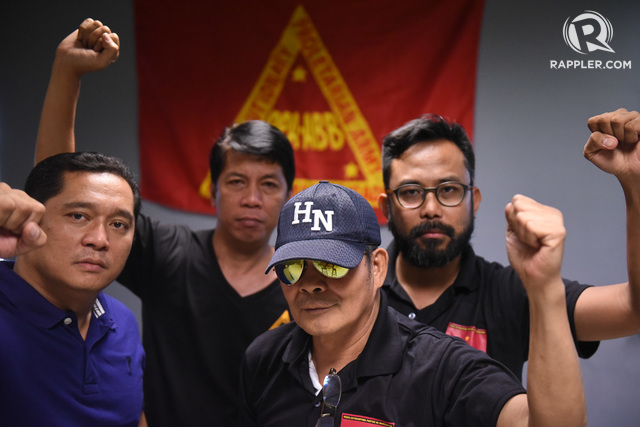The Rebolusyonaryong Partido ng Manggagawa is asking the Duterte government to reopen the stalled peace process with the group

A breakaway faction of the Communist Party of the Philippines (CPP) has asked for peace talks with the Duterte administration, saying the 16-year-old deal it had signed with the Estrada administration has yet to be fully implemented.
Ka Mark, spokesman of the Rebolusyonaryong Partido ng Manggagawa, told Rappler in a recent interview that the first round of talks between the government and their former communist comrades in Oslo, Norway, helped create a climate of peace that he hoped would also cover other rebel movements like the RPM.
The RPM is the political arm of the Alex Boncayao Brigade (ABB). It was the urban partisan arm of the CPP for many years until the hit squad broke away from the party in the 1990s. The ABB was behind a spate urban assassinations during the administrations of President Corazon Aquino and President Fidel Ramos.
In 1998, the group held peace talks with the Estrada administration and signed a preliminary agreement with it in December 2000. The deal compelled RPM to stop its attacks, allowed government to issue 100 members licensed firearms and release detained RPM members, and implement livelihood projects in their communities.
Ka Mark said the agreement has not been completely implemented, and they disagreed with the administration of President Benigno Aquino III on the execution of some of its provisions.
“We challenge President Duterte to deepen his pronouncement on being a leftist and address fundamental issues on social justice,” Ka Mark said.
Letter to Dureza
The group wrote Chief Peace Adviser Jesus Dureza in July to “formally convey our decision and optimism for the continuation of our engagement in the peace process.”
The RPM told Dureza: “It has been 5 years since our last official engagement in the peace table. The previous administration didn’t provide the policy regime nor the management we deemed necessary to pursue the implementation of the 2000 Peace Agreement.” Despite this, they have respected the ceasefire that they committed to the Estrada government, the RPM said.
RPM units are mostly in the Visayas, with Panay and Negros islands as the base of most of its members.
The bitter split
The possible reopening of talks between the Duterte administration and the RPM would, in some ways, also reopen old wounds in the CPP.
The CPP had accused RPM leaders of betraying the revolution and sentenced its key leaders to death.
The biggest casualty from the RPM ranks was former communist leader and RPM founding chairman Arturo Tabara, who was gunned down in Metro Manila in 2004. The CPP claimed responsibility for his death.
Previous to this, other communist leaders who had broken away from the CPP leadership were also killed, such as former New People’s Army chief Romulo Kintanar (2003) and former Manila-Rizal Regional Party Committee boss and the ABB’s political chief, Felimon Lagman (2001).
Ka Mark said the death sentence on their members continues since the CPP also continues to brand them “counter-revolutionaries.” The RPM's last casualty died in December 2015 on Panay Island, he said.
“The attacks emanated from them (CPP),” Ka Mark said. “Joma (Sison) was quoted as saying that they are extending the hand of reconciliation. Then they should respect plurality because they have no monopoly of the revolution. They should be more tolerant of contrary views.”
In the mid-1990s, Sison, who lives in exile in The Netherlands, led a massive back-to-basics "rectification campaign" within the CPP that expelled key leaders and units deemed “counter-revolutionaries” and “military adventurers.”
The bitter split preceded a bloody purge within the party.
Since then, the movement has seen its prominent leaders join either the “reaffirm” faction led by Sison and the couple Benito and Wilma Tiamzon, or the “rejectionist” groups led by the late Kintanar and Lagman, now both dead.
Hope in Oslo
The CPP-led National Democratic Front just concluded the first round of talks with the Duterte government, with the New People's Army and the Philippine military declaring a ceasefire. The Oslo talks also witnessed the historic reunion of Sison and the Tiamzons after 3 decades.
The ceasefire is indefinite while the talks continue and as long as either side does not break it.
Ka Mark said he's not that optimistic about how the government's talks with the NDF would turn out, given the CPP's continued focus on armed struggle as its primary form of struggle. "Other units would be open to a negotiated settlement, but some would still pursue the armed struggle even if they sign a peace deal," he added.
But he conceded that Duterte is the game changer in all this. "Duterte changed the dynamic. It's the man himself. They (communists) trust him," he added.
Does he expect the Duterte administration to hold simultaneous talks with RPM then? "It's up to the government. The ball is in their court," Ka Mark added.

No comments:
Post a Comment
Note: Only a member of this blog may post a comment.